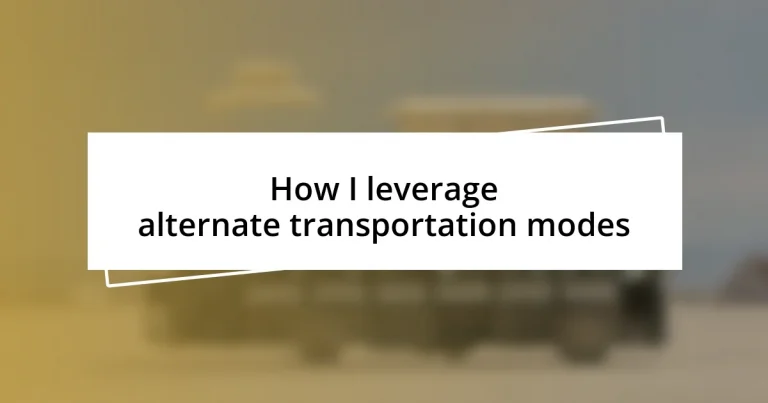Key takeaways:
- Alternative transportation modes, such as biking and public transit, enhance personal well-being, foster community connections, and positively impact the environment.
- Integrating multiple transportation options can lead to more enjoyable, spontaneous experiences and help overcome logistical challenges during commutes.
- Effective route planning, including using apps and being flexible, can uncover hidden gems and improve overall travel satisfaction.
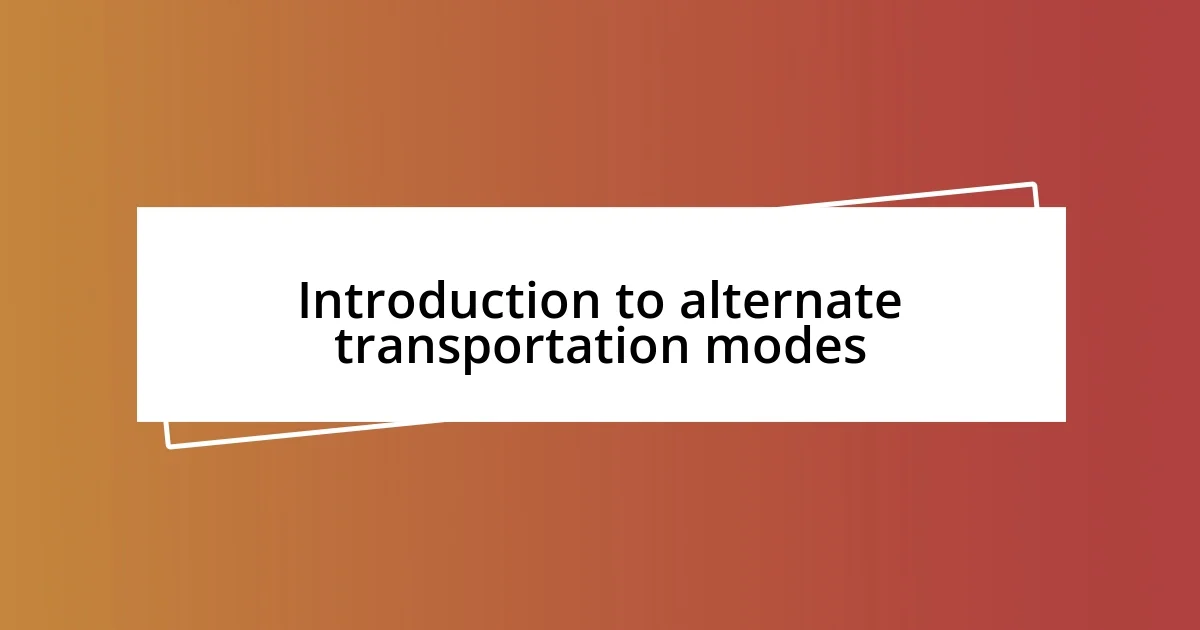
Introduction to alternate transportation modes
Alternate transportation modes are reshaping how we navigate our world. The last time I hopped on my bike instead of driving, I felt an invigorating sense of freedom. Have you ever experienced that rush of fresh air, or realized how much more connected to your surroundings you can feel when you’re not encased in a car?
These alternative options, including biking, public transit, and ridesharing, often offer environmental benefits that can be deeply satisfying. I remember a rainy day when I opted for the bus instead of my usual commute. The simple act of giving up my car allowed me to read a book and enjoy a cozy time while actively reducing my carbon footprint. Have you considered how your travel choices impact the planet?
Embracing alternate modes of transport can significantly enhance our daily lives. Not only do they foster a sense of community and connection with our neighborhoods, but they also save money in the long run. I’ve found that combining walking with transit not only improves my physical health but also brightens my mood — something everyone could use a little more of. How do you think exploring these alternatives could change your daily routine?
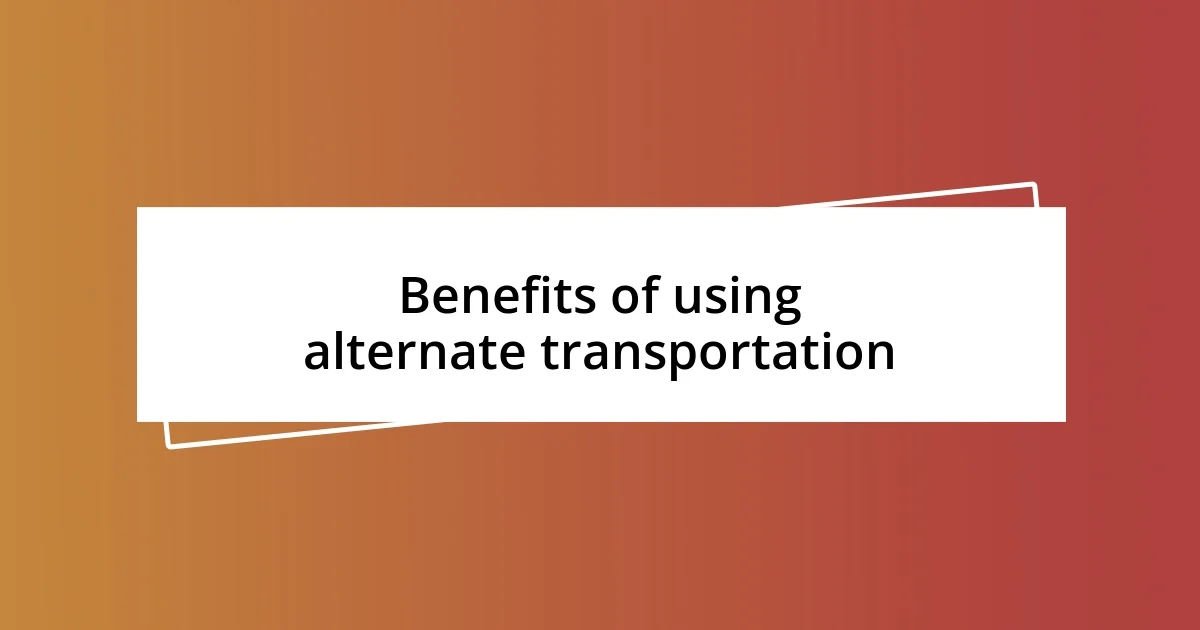
Benefits of using alternate transportation
I can’t help but feel a wave of satisfaction when I choose alternate transportation. The relief from bypassing the rush hour traffic or the stress of finding parking always puts a smile on my face. I recall one sunny Saturday when I decided to take my skateboard to a local café instead of driving. It was not just about the journey; it was about feeling alive, enjoying the breeze, and getting some exercise. Each ride makes me appreciate the little things, like the sound of laughter from a nearby park or the aroma of fresh coffee wafting through the air.
The benefits of alternate transportation extend far beyond personal thrill. Here are some noteworthy advantages:
- Environmental Impact: Reducing greenhouse gas emissions and air pollution helps protect our planet for future generations.
- Cost Savings: Using public transport or cycling can save on fuel, parking, and maintenance costs.
- Health Benefits: Active modes of transport like walking or biking contribute to better physical health and can provide mental health boosts.
- Community Engagement: Alternate transport fosters connections with local businesses and neighborhoods, creating a sense of belonging.
- Time Efficiency: In many cases, using transit or biking can actually save time, especially in congested urban areas.
It’s a win-win situation, transforming the way we experience our surroundings while contributing positively to our communities and environment.
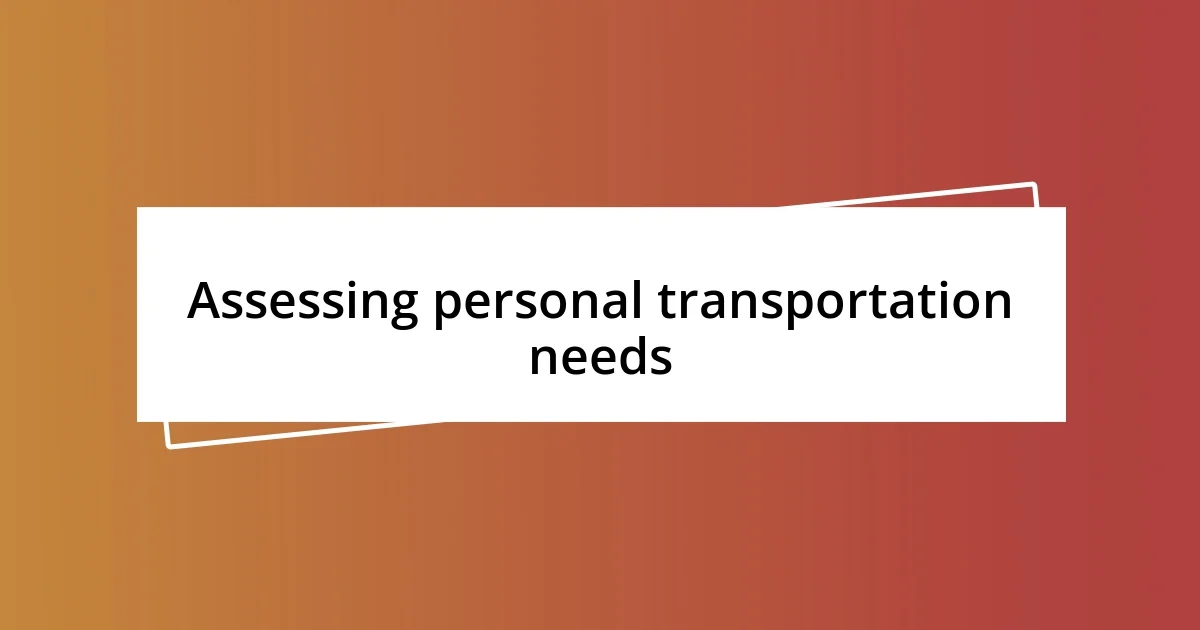
Assessing personal transportation needs
When assessing personal transportation needs, it’s crucial to reflect on my daily activities and how I get from point A to point B. For instance, I often find myself weighing the convenience of driving against the benefits of walking or taking public transportation. Recently, I evaluated my weekly commute, and I realized that switching to my bike not only saved me time but also gave me a refreshing start to my day.
I recommend listing the factors that matter most to you. Is it cost, convenience, environmental impact, or even the joy of the ride? For me, the exhilaration of biking down a tree-lined street is unmatched. I once discovered a hidden local bakery while cycling, proving that alternate modes of transportation can add unexpected joys to life.
Lastly, consider your location. Are you in a bustling city with established public transport, or do you live in a quieter area where biking is more feasible? I remember moving to a city with extensive public transit. It opened up a world of possibilities, where the journey became as enjoyable as the destination.
| Factor | Personal Reflection |
|---|---|
| Cost | I often save money by cycling instead of driving. |
| Convenience | Public transit sometimes allows me to read or relax during my commute. |
| Environmental Impact | Each time I choose biking, I feel a sense of contributing to a healthier planet. |
| Quality of Experience | Exploring my neighborhood on foot leads me to discover hidden gems. |
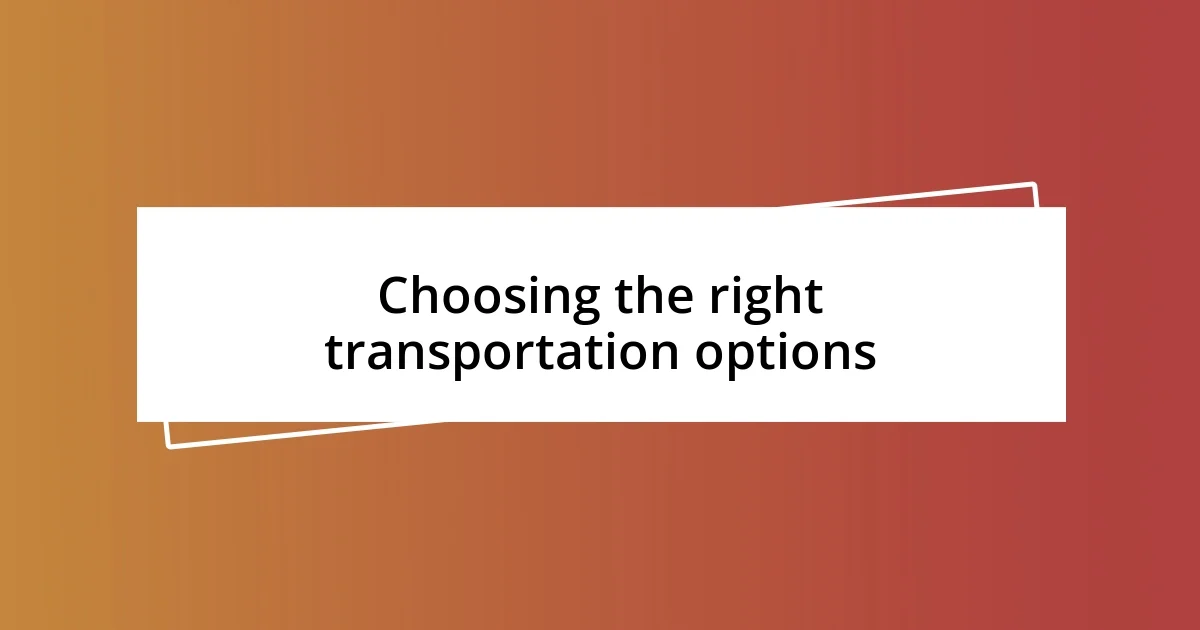
Choosing the right transportation options
Choosing the right transportation options requires a thoughtful approach to what fits best with my lifestyle. I often find myself pondering the question: “What do I genuinely need from my commute?” For example, last month, I opted for the train for a weekend trip, and the ease of sitting back with a book made the journey just as enjoyable as the destination itself.
It’s also essential to consider where I live. In a dense urban area, I remember feeling liberated when I discovered a comprehensive bike lane network. Suddenly, the city felt smaller, more accessible, and I was able to traverse it without the hassle of car ownership. That realization sparked joy and an unexpected connection to my surroundings, as I began to view familiar streets through a new lens.
In reflecting on the emotional aspects, I often think about how my choices impact my mood. Riding my scooter to work, I find that the adrenaline rush from weaving through traffic leaves me energized, far more so than the monotonous drive I used to endure. If I can arrive at the office feeling excited rather than drained, isn’t it worth exploring all available options? Every mode of transport has its unique charm, and discovering these nuances is part of the adventure.
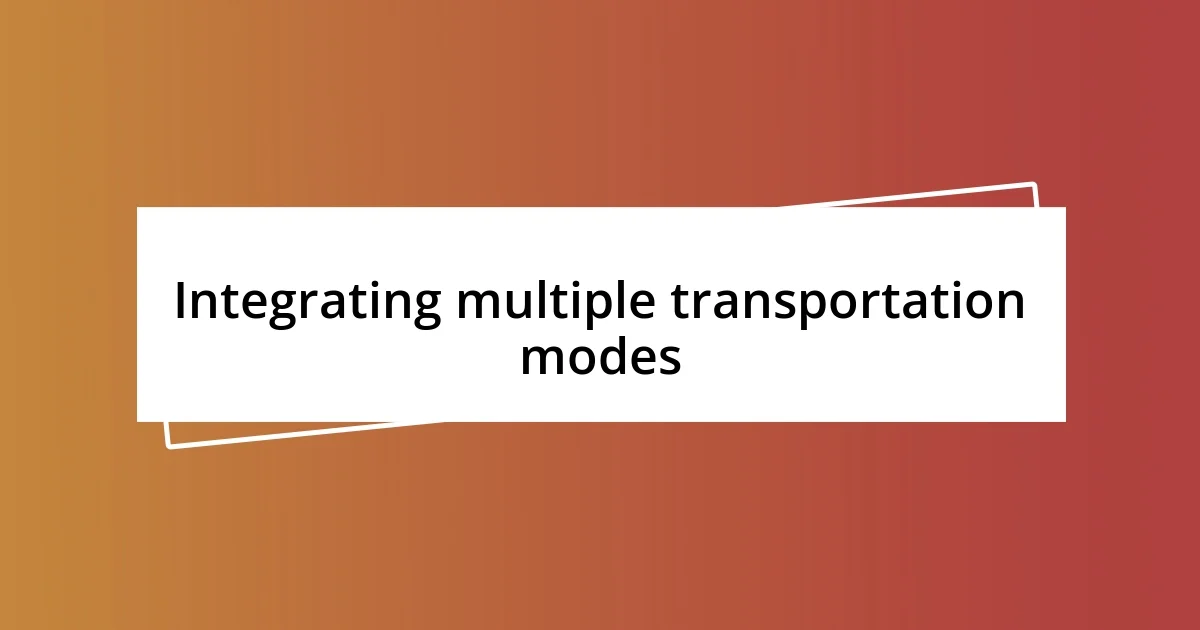
Integrating multiple transportation modes
Integrating different transportation modes can transform the way I experience my daily life. Just last week, I took the bus to a bike rental station, where I picked up a bike to explore a new part of the city. It was a seamless transition that not only saved me money but also allowed me to enjoy the journey. I could feel the fresh air on my face as I pedaled, enhancing my mood and making me more alert.
I often think about how powerful it feels to combine these options. You might wonder, “How can simplifying my commute really make a difference?” From my perspective, I’ve found that blending biking with public transport removes barriers. For instance, when I’ve needed to cover longer distances or reach destinations that aren’t directly on a transit line, taking my bike on the train has been a game changer. The little thrill I get from hopping off the train and gliding onto the bike path always fills me with anticipation.
Furthermore, I’m continually struck by how integrating these modes invites spontaneity into my travels. Once, after cycling through a picturesque park, I stumbled upon a new café that instantly became my favorite spot. It’s moments like these that remind me that the journey can be just as enriching as the destination. Isn’t it exciting to think about the discoveries that await when I embrace a mix of transportation options?
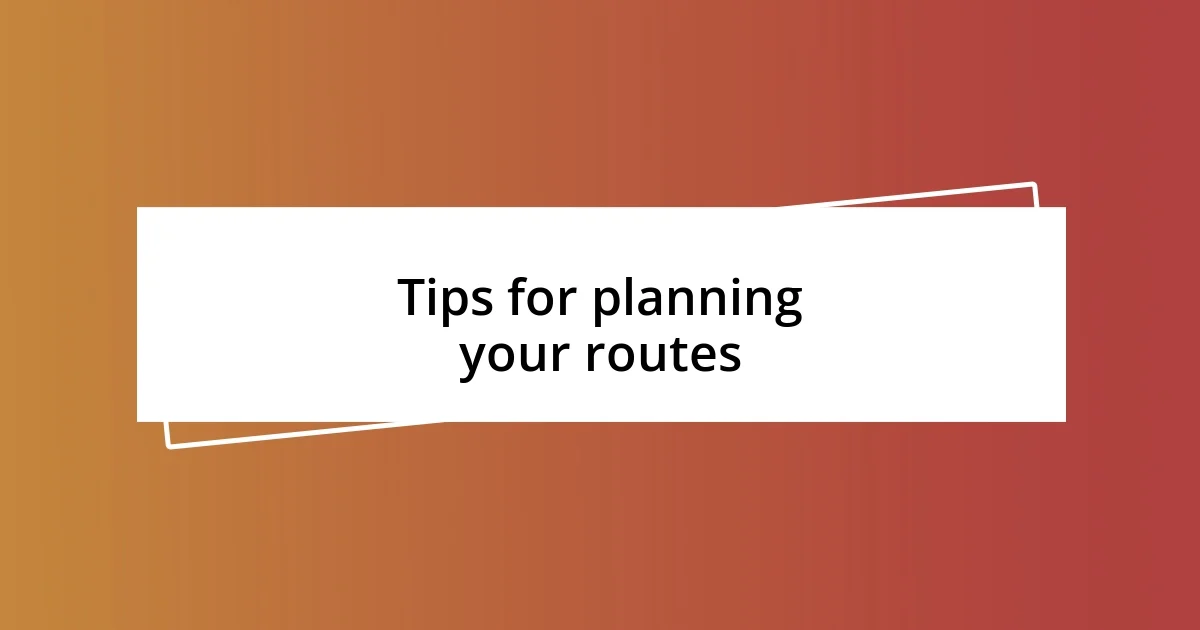
Tips for planning your routes
When planning my routes, I always start by using map apps to explore various options. I’ll plug in my destination and then play around with the routes suggested for different transportation modes. Last week, while heading to a friend’s house, I found that taking the subway and then walking through a vibrant neighborhood added an extra 15 minutes but opened up a lovely street fair that I would have missed otherwise.
I also like to check public transport schedules ahead of time. Sometimes, I wonder, “Could I save time by timing my departures perfectly?” Recently, I synced my bike ride with a bus schedule, which allowed me to avoid rush-hour traffic. This dual approach not only got me to my destination faster but also kept my frustration at bay—who doesn’t appreciate a smoother commute?
Another tip I swear by is to consider the flexibility of my planned route. For instance, when I visited a new city, I plotted a general direction but left the option open to change routes based on how I felt that day. It led to an unexpected detour into a quaint local gallery that turned out to be a highlight of my trip. Have you ever discovered something wonderful just by being open to change? It’s moments like these that make alternative transportation so rewarding and adventurous!
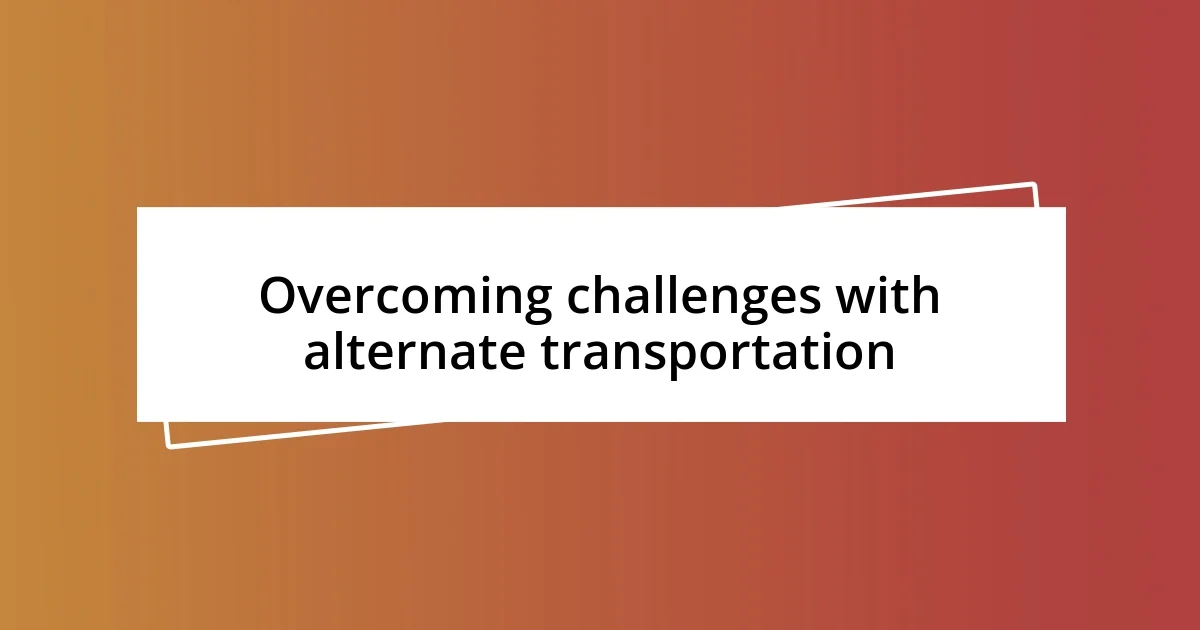
Overcoming challenges with alternate transportation
Overcoming challenges with alternate transportation can feel daunting at times. I remember trying to navigate a complex bus schedule when I first made the switch. It was frustrating, but I took a deep breath and downloaded a real-time tracking app, which made all the difference. Watching the bus approach from the comfort of a nearby café transformed my anticipation into excitement rather than stress.
Sometimes, weather can throw a wrench in my plans. I once left the house eager to cycle to an event, only to be greeted by unexpected rain. Instead of letting it ruin my day, I adapted. I parked the bike and took the bus instead. That spontaneity blossomed into a fun conversation with a fellow traveler who shared local hidden gems I’d never heard of.
Navigating unfamiliar areas can be tricky, too. I vividly recall my first day in a new city, filled with uncertainty and a bit of anxiety about getting lost. But I decided to embrace the challenge and used a mix of walking and public transport. Each wrong turn led to little discoveries—like stumbling upon a vibrant street mural or a delicious food truck. These experiences not only enriched my journey but shifted my mindset to see challenges as opportunities for adventure. Isn’t it fascinating how a simple journey can lead to so many unexpected treasures?












